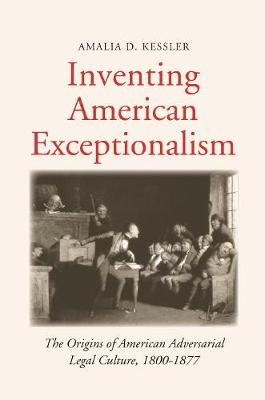
Inventing American Exceptionalism
The Origins of American Adversarial Legal Culture, 1800-1877
Seiten
2017
Yale University Press (Verlag)
978-0-300-22225-8 (ISBN)
Yale University Press (Verlag)
978-0-300-22225-8 (ISBN)
- Titel z.Zt. nicht lieferbar
- Versandkostenfrei
- Auch auf Rechnung
- Artikel merken
A highly engaging account of the developments-not only legal, but also socioeconomic, political, and cultural-that gave rise to Americans' distinctively lawyer-driven legal culture
A highly engaging account of the developments—not only legal, but also socioeconomic, political, and cultural—that gave rise to Americans’ distinctively lawyer-driven legal culture
When Americans imagine their legal system, it is the adversarial trial—dominated by dueling larger-than-life lawyers undertaking grand public performances—that first comes to mind. But as award-winning author Amalia Kessler reveals in this engrossing history, it was only in the turbulent decades before the Civil War that adversarialism became a defining American practice and ideology, displacing alternative, more judge-driven approaches to procedure. By drawing on a broad range of methods and sources—and by recovering neglected influences (including from Europe)—the author shows how the emergence of the American adversarial legal culture was a product not only of developments internal to law, but also of wider socioeconomic, political, and cultural debates over whether and how to undertake market regulation and pursue racial equality. As a result, adversarialism came to play a key role in defining American legal institutions and practices, as well as national identity.
A highly engaging account of the developments—not only legal, but also socioeconomic, political, and cultural—that gave rise to Americans’ distinctively lawyer-driven legal culture
When Americans imagine their legal system, it is the adversarial trial—dominated by dueling larger-than-life lawyers undertaking grand public performances—that first comes to mind. But as award-winning author Amalia Kessler reveals in this engrossing history, it was only in the turbulent decades before the Civil War that adversarialism became a defining American practice and ideology, displacing alternative, more judge-driven approaches to procedure. By drawing on a broad range of methods and sources—and by recovering neglected influences (including from Europe)—the author shows how the emergence of the American adversarial legal culture was a product not only of developments internal to law, but also of wider socioeconomic, political, and cultural debates over whether and how to undertake market regulation and pursue racial equality. As a result, adversarialism came to play a key role in defining American legal institutions and practices, as well as national identity.
Amalia D. Kessler is the Lewis Talbot and Nadine Hearn Shelton Professor of International Legal Studies at Stanford University and winner of the American Historical Association’s J. Russell Major Prize for A Revolution in Commerce.
| Erscheinungsdatum | 07.03.2017 |
|---|---|
| Reihe/Serie | Yale Law Library Series in Legal History and Reference |
| Zusatzinfo | 15 b-w illus. |
| Sprache | englisch |
| Maße | 156 x 235 mm |
| Gewicht | 671 g |
| Themenwelt | Geschichte ► Allgemeine Geschichte ► Neuzeit (bis 1918) |
| Geisteswissenschaften ► Geschichte ► Regional- / Ländergeschichte | |
| Geschichte ► Teilgebiete der Geschichte ► Militärgeschichte | |
| Recht / Steuern ► Allgemeines / Lexika | |
| Recht / Steuern ► EU / Internationales Recht | |
| Recht / Steuern ► Rechtsgeschichte | |
| ISBN-10 | 0-300-22225-4 / 0300222254 |
| ISBN-13 | 978-0-300-22225-8 / 9780300222258 |
| Zustand | Neuware |
| Haben Sie eine Frage zum Produkt? |
Mehr entdecken
aus dem Bereich
aus dem Bereich
Europa 1848/49 und der Kampf für eine neue Welt
Buch | Hardcover (2023)
DVA (Verlag)
CHF 67,20
Giordano Bruno - ein ketzerisches Leben
Buch | Hardcover (2024)
C.H.Beck (Verlag)
CHF 41,85


